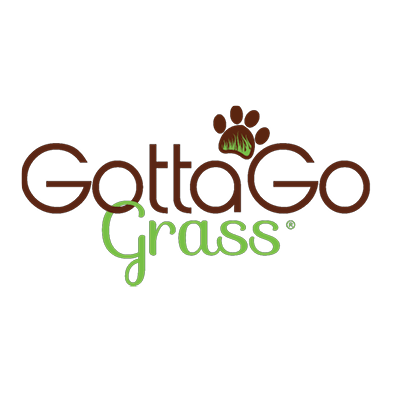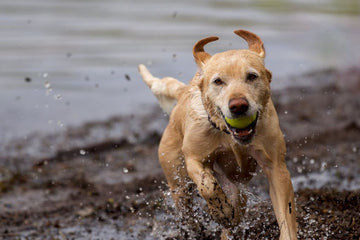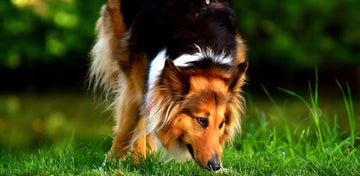
Eating grass is a common behavior in dogs. While it may seem puzzling, some dogs do it simply for taste. However, there are cases where dogs may nibble on grass out of boredom.
Most experts agree that this behavior isn't harmful. But, dog owners should be aware of potential underlying causes and address them immediately to ensure their dog's well-being.
Why Is My Dog Eating Grass?
Dogs are naturally curious creatures, often exploring different tastes and textures. Some dogs find grass appealing, whether it's the grass on your lawn or the grass pad for dogs, and may eat it simply because they enjoy the taste. Additionally, dogs may eat grass out of boredom, particularly without physical or mental stimulation. While occasional grass-eating due to boredom is not a concern, ensuring your dog receives enough exercise and playtime is important to prevent this behavior.
Do dogs eat grass to relieve an upset stomach?
It is a widely held belief that dogs eat grass to induce vomiting and soothe their stomachs. However, there is little evidence to suggest that dogs turn to grass as a form of self-medication. Even studies suggest that most dogs are not sick before eating grass—or at least they don't seem so—and the behavior does not usually lead to vomiting.
Another suggested reason for dogs eating grass is to fulfill unmet nutritional needs, including a need for fiber. Because grass has fiber, dogs may eat it to improve digestion or supplement their diet. If you suspect your dog is eating grass due to a lack of fiber, consider adjusting its diet and adding dog-safe fruits and vegetables with high fiber content, such as apples, blueberries, pumpkin, broccoli, and celery.

Can Eating Grass Make Your Dog Sick?
As mentioned earlier, eating grass is a common dog behavior, particularly in younger dogs, and is generally harmless. However, there are a few potential risks to be aware of. Some dogs may throw up after eating grass, which could be due to stomach irritation. There is also a risk of chemical exposure if the grass has been treated with pesticides, herbicides, or fertilizer. Read here to learn how long to stay off grass after a fertilizer treatment.
If your dog eats grass excessively or shows signs of illness afterward, it's best to consult your veterinarian. While rare, grass may cause an obstruction in the digestive tract.
How to Stop Dog From Eating Grass
Whatever the reason for your dog's grass-eating habits, occasional grazing is unlikely to cause significant damage to your lawn. However, you should consider if your dog eats too much grass, particularly if it often makes it vomit. Additionally, if you have treated your lawn with chemicals or take your dog to a park where the grass may be treated, it's crucial to keep your dog from eating it. Other red flags include if your dog eats other toxic plants.
Monitoring what your dog eats and ensuring they have a complete and balanced diet can help reduce the likelihood of your dog eating grass excessively. Check out some tips on preventing your dog from eating grass:
Leave it command: Teach your dog the "leave it" command first by showing it a treat, covering it with your hand, and then saying, "Leave it." When your dog stops trying to get the treat, reward them. You can practice this command every time it tries to eat grass.
Food-Motivated Training: During walks, when your dog starts chewing grass, use the "leave it" command and reward them with a treat for complying. This redirects its attention away from the grass.
Positive Reinforcement: In addition to treats, praise your dog when it comes to you instead of eating grass. This practice helps them associate not eating grass with positive outcomes.
Identify Underlying Reasons: It's important to highlight that some dogs eat grass due to possible health issues such as boredom, stress, or a nutritional deficiency. It's best to consult your vet to rule out these possibilities and outline the best course of action, such as adjusting your dog's diet.
Use Deterrents - You can use natural, dog-safe deterrents to discourage your dog from eating grass. These products usually taste bitter or have a strong scent that dogs find unappealing. Over time, your dog will learn to associate the grass with the unpleasant experience, which can help reduce grass-eating habits. These deterrents can also be effective on grass pee pads for dogs.

How Grass Pads for Dogs Can Help
Aside from grazing on your lawn, your dog may start targeting its grass pad. In addition to the training tips above, you can help prevent your pup from chewing on its grass pee pad by monitoring it every time it goes for a bathroom break.
A key advantage of using grass pee pads for dogs is that they provide a convenient potty solution you can set up indoors or on a balcony or patio. These pads designate a bathroom space for your dog to relieve themselves while allowing you to supervise them. This setup not only keeps your living space clean but also satisfies your dog’s natural instincts by providing a familiar real grass surface. Moreover, grass potty pads can be particularly beneficial for older dogs, puppies, or those with mobility issues, as they provide a sanitary and accessible spot for bathroom breaks.
Consistency and patience are key, and with time, your dog can unlearn its grass-eating behavior.
Did you find this article helpful? Read our blog for more dog-training tips and tricks.




